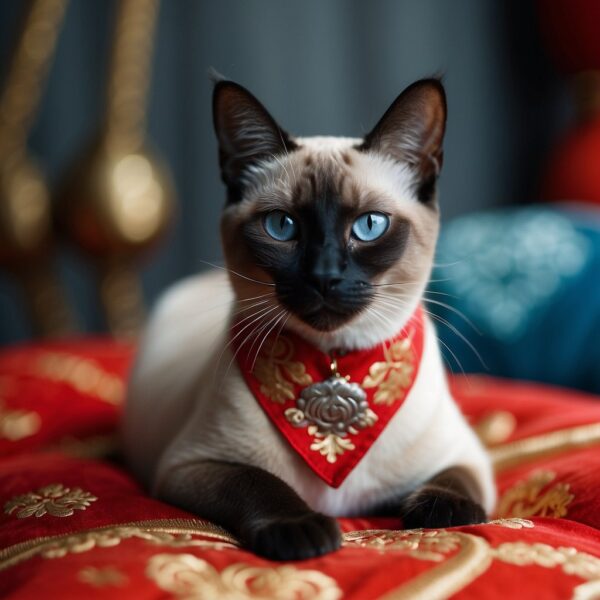
Chinese Names for Cats
Naming a cat can be a delightful process that draws upon various cultural and linguistic inspirations. Within Chinese culture, the significance of naming extends beyond a mere label to a meaningful connection that often embodies the characteristics, aspirations, or beauty seen in the cat. Chinese cat names carry a certain grace and eloquence, frequently derived from qualities, natural elements, and treasured concepts. These names not only sound melodious but also often have deep and prosperous meanings, reflecting the rich symbolism and history of China.
Selecting the perfect Chinese name for a feline friend involves more than just an appreciation for the sound of the name; it’s an opportunity to honor the rich tapestry of Chinese culture. From mythological references to geographical inspirations, each name tells a story, paints a picture, or captures an essence. While the popularity of names changes over time, the cultural and historical significance of these names remains timeless, and the process of naming becomes a blend of personal taste and cultural homage.
Key Takeaways
- Cat names in Chinese culture are imbued with meanings that reflect traits or wishes for the cat.
- A cat’s name may draw from various aspects of Chinese culture, including geography and mythology.
- Choosing the right name is a thoughtful process that acknowledges the cultural significance of names in China.
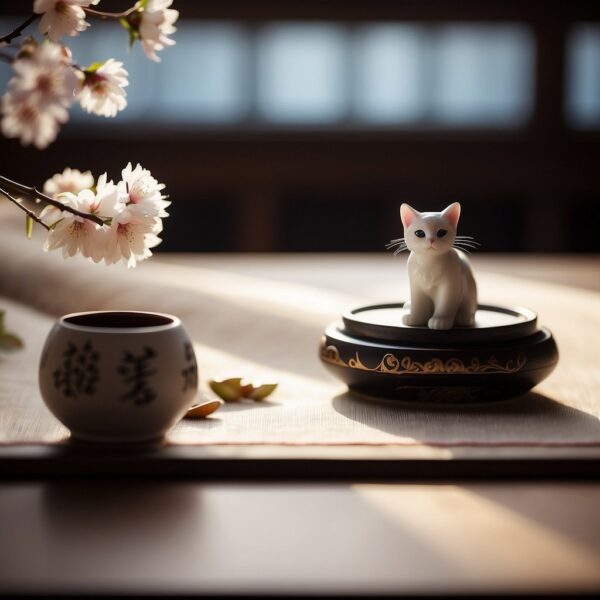
Origins of Chinese Cat Names
Chinese cat names are deeply rooted in the country’s expansive culture, reflecting a blend of linguistic heritage, mythology, and the value placed on certain traits and concepts. In ancient China, cats were revered for their ability to ward off evil spirits, and their names often carry significant meanings, encapsulating the high esteem in which they were held.
Cultural Significance:
Names derived from Chinese culture often embody virtues, natural elements, and desirable character traits. They are chosen not only for their phonetic appeal but also for the meanings they convey.
Examples include:
- Heng: eternal companion
- Chi: a cat with abundant energy
- Hui: intelligent or wise
Mythological Influences:
Mythology also plays a significant role in shaping Chinese cat names, drawing inspiration from legendary creatures and stories told through generations.
Names such as:
- Huli jing: the spirit of a fox
- Jingwei: a mythical bird
- Jiaolong: a sea dragon
Symbolism:
Many Chinese names are symbolic, reflecting aspirations or characteristics parents hope to see in their cats. These symbolic names are often chosen to impart a sense of the cat’s place within the household or the guardian’s life.
For instance:
- Bao: treasure
- Bik: jade, symbolizing purity and preciousness
The selection of a name in Chinese culture is a thoughtful process, demonstrating the intertwining of language, symbolism, and the high regard for feline companions. As such, Chinese cat names carry within them the richness of tradition and the cultural importance placed upon these beloved animals.
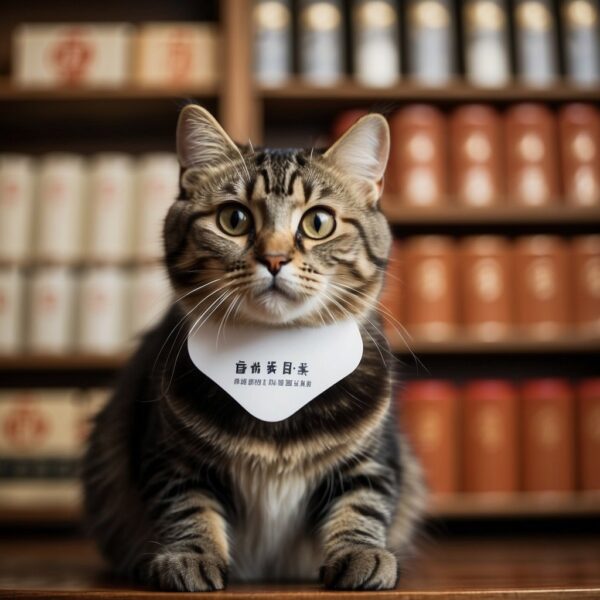
Choosing the Right Chinese Cat Name
Selecting a suitable Chinese name for a cat requires consideration of several factors such as gender, personality, appearance, and symbolism. These names can be a reflection of the cat’s individual characteristics or the parent’s aspirations for their cat.
By Gender
For male Chinese cat names, monikers like Long (dragon) convey strength, while Wei (greatness) evokes a sense of power and respect. Females names might include Ling (delicate) or Hua (flower), which exemplify beauty and grace.
- Male Names
- Long – Strong and mythic
- Wei – Powerful
- Female Names
- Ling – Delicate and elegant
- Hua – Beautiful and blossoming
By Personality
A cat’s personality greatly influences the choice of name. Ning (peaceful) would suit a serene cat, while Jing (quiet) would be ideal for a cat with a calm nature. Ying (brave) might epitomize a daring and adventurous feline.
- Adventurous Cats
- Ying – Brave and bold
- Serene Cats
- Ning – Peaceful and calm
- Jing – Quiet and tranquil
By Appearance
A black cat could be named Hei (black), indicating its fur color, or Lan (blue) could be used ironically for a cat with strikingly clear eyes. Bai (white) would be fitting for a cat with a snowy coat.
- Dark-colored Cats
- Hei – Black, sleek fur
- Light-colored Cats
- Bai – White, pure fur
By Symbolism
Names can also reflect cultural symbolism. Fu (luck) and Bao (treasure) are popular for their positive connotations. Mei (beautiful) emphasizes aesthetic appreciation, and Ming (bright) can symbolize intelligence or a luminous personality.
- Lucky Names
- Fu – Associated with luck
- Bao – Treasured and valued
- Intelligent Personality
- Ming – Bright and intelligent
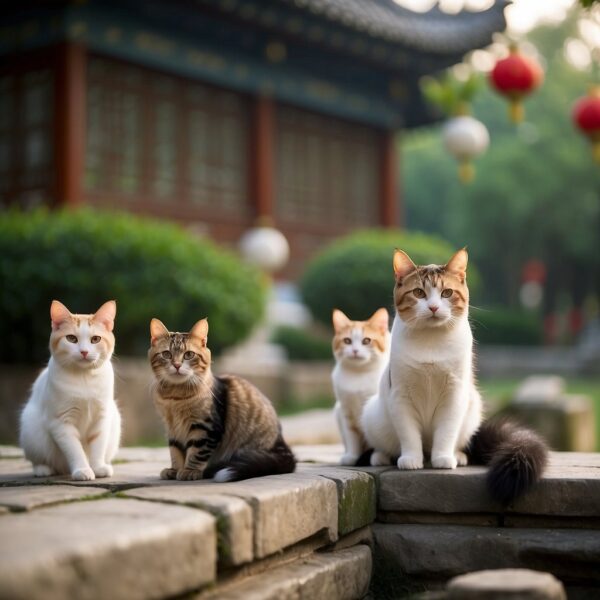
Popular Chinese Cat Names and Their Meanings
When choosing a name for your cat, selecting a Chinese name can be a touch of elegance and reflect a deep meaning. Here are some popular Chinese cat names along with their significances:
| Chinese Name | Pinyin | Meaning |
|---|---|---|
| Ài | Love | |
| Lán | Orchid | |
| Mi | Beauty | |
| Q | Start | |
| Róng | Glory | |
| Tíng | Graceful | |
| Ch | Beginning | |
| Yí | Pleasant | |
| J?n | Brocade | |
| Bo | Treasure | |
| Yàn | Gorgeous | |
| Líng | Tinkling bells | |
| Yuè | Moon | |
| Z | Son / Seed / Small | |
| Lì Huá | Beautiful China | |
| Qin | Thousand |
Individual Highlights:
- Ài suggests a cat with an affectionate and loving character, while Lán could reflect a cat’s elegance, like an exquisite orchid.
- If a cat has a striking appearance, the name Mi resonates with beauty, and Yàn goes further to commend a truly gorgeous feline.
- For those inspired by aspirations or new beginnings, Q and C capture the essence of starts and origins.
- Naming a cat Róng can signify hope for their life to be filled with glory, and Mi , aside from beauty, also implies someone admirable.
It’s essential to select a cat name that not only suits the pet’s personality but also carries a significant and positive connotation. These names provide just a glimpse into the rich tapestry of Chinese language and culture that can be reflected in your cat’s name.
Chinese Cat Names Inspired by Geography
Chinese geography offers a rich tapestry of inspiration for cat names. The diverse landscapes, ranging from the majestic Himalayas to the iconic Yangtze River, can be reflected in the names one chooses for their feline.
Mountains and Ranges:
- Himalaya – A name that denotes the grandeur of the world’s highest mountain range.
- TaiShan – After Mount Tai, known for its historical and cultural significance.
Rivers and Lakes:
- ChangJiang – Drawing from the Chinese name for the Yangtze River, the longest river in Asia.
- QingHai – Named after Qinghai Lake, the largest lake in China; Qing means “cyan” or “green,” while Hai means “sea.”
Cities and Regions:
- Shanghai – A modern name for a cosmopolitan cat, after the bustling metropolis.
- Sichuan – Perfect for a cat with a spicy personality, named after the region famous for its flavorful cuisine.
Landmarks and Natural Wonders:
- Panda – Many may opt for the name of China’s beloved bear, symbolizing friendship and peace.
- Longjing – Named after the famous Longjing tea, ideal for a cat with a soothing presence.
Using geographical features and landmarks not only provides unique names but also honors the beauty and diversity of China’s landscapes. Each name carries the essence of the place it represents, offering cats an identity rich with cultural significance.
Cultural Significance of Cats in China
In Chinese culture, cats are revered for their elegance and mystery. They are often seen as symbols of good fortune and prosperity. The cultural significance of these feline creatures can be traced back to ancient times and continues to influence modern practices.
Historical Resonance: Cats have been part of Chinese households and folklore for centuries, embodying a spirit of independence and grace.
Symbolism in Folklore: They often feature in mythology and folklore, where they are sometimes associated with transformative powers and believed to possess the ability to see spirits.
Lucky Charms: The presence of a cat is considered fortunate, capable of attracting positive energy and repelling malevolent spirits.
Breed Significance: The native Chinese Li Hua cat is particularly valued for its intelligence and hunter’s instinct, contributing to agricultural communities by controlling pests.
Names Reflecting Traits and Hopes: Cat names may represent desired qualities or wishes for their companion:
- Zhong: Loyalty and devotion
- Shu : Diligence and protection
- Hua: Splendor and beauty
- Guang : Light and clarity
The role cats play within Chinese society is multifaceted, extending beyond companionship to embody elements of traditional beliefs and cultural aesthetics. The reverence for these animals is reflected in how cats are named, treated, and commemorated within Chinese households.
Mythology and Folklore
In the realm of Chinese cat names, mythology and folklore play a significant role. The names carry traditional significance and various connotations deriving from tales, legends, and historical figures.
- Baihu: Revered as the White Tiger, it is viewed symbolically as one of the four mythical creatures in the Chinese constellations, representing the west and the autumn season.
- Longma: The fusion of the dragon (“long”) and the horse (“ma”), often associated with auspiciousness and the concept of heroic nobility, an ideal name for cats with a majestic presence.
Historical and mythological characters also influence naming choices. For example:
- Mulan: Inspired by the legendary heroine Hua Mulan from Chinese folklore, the name connotes bravery and valor, ideal for a courageous and adventurous feline.
Here is a brief look at categories reflecting folklore:
| Category | Examples | Significance |
|---|---|---|
| Creatures | Baihu, Longma | Mythical connotations |
| Historical | Hua Mulan (inspiring Mulan) | Heroic attributes |
When choosing a name from mythology and folklore, one often seeks to bestow their cat with wishes of certain qualities associated with that mythological figure or folklore character. It’s not just a name; it’s a meaningful connection to ancient tales and cultural heritage.
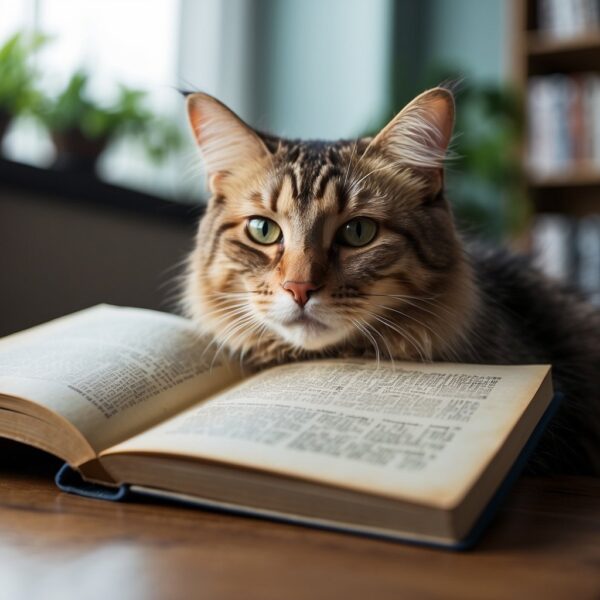
Frequently Asked Questions
Choosing a Chinese name for a cat can offer a meaningful connection to Chinese heritage and culture, reflecting characteristics or aesthetic qualities. Here are some common inquiries about naming felines with Chinese inspiration.
What popular names are given to male cats in China?
For male cats, names such as Huan, which means ‘always happy,’ or Hui, signifying ‘intelligent or wise,’ are popular. Names that embody bravery or strength like Long, meaning ‘dragon,’ are also frequently chosen for male cats.
What are some adorable names for female kittens inspired by Chinese culture?
Female kittens are often given names like Chun, symbolizing ‘springtime,’ or Mei, which translates to ‘beautiful.’ Bao, meaning ‘treasure,’ is another charming choice, reflecting the cherished status of the cat.
Can you suggest unique Chinese-inspired names for a pet cat?
Unique Chinese-inspired names include Jiaolong, referring to a mythical sea dragon, or Jingwei, which signifies a mythical bird. Another distinctive option is Jiufeng, a name for a bird with nine heads in Chinese mythology.
What are some funny or clever Chinese-themed names for cats?
Names with playful or clever connotations include Toshiko, meaning ‘clever child,’ or Huahua, which is a repeating double-syllabic name and translates to ‘flower flower,’ often used for cats.
What are the traditional names used for cats in Chinese households?
Traditional Chinese households might name their cats Mao, simply meaning ‘cat,’ or choose names inspired by virtues or precious materials like Zhen, implying ‘precious,’ or Bik, signifying ‘jade.’
Are there any Chinese names for cats that are inspired by local cuisine?
Names inspired by local cuisine include Baozi, after the steamed bun, or Xiao Long, shorthand for Xiao Long Bao, a type of soup dumpling. These names not only reflect a fondness for the cuisine but also add a touch of cultural flair to the cat’s identity.